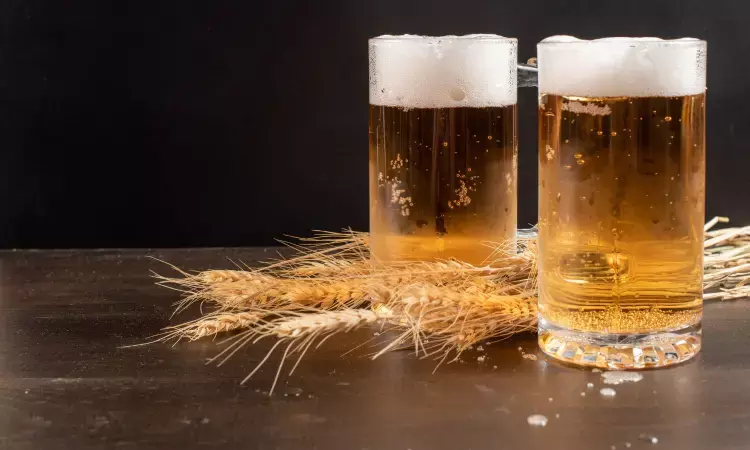- Home
- Medical news & Guidelines
- Anesthesiology
- Cardiology and CTVS
- Critical Care
- Dentistry
- Dermatology
- Diabetes and Endocrinology
- ENT
- Gastroenterology
- Medicine
- Nephrology
- Neurology
- Obstretics-Gynaecology
- Oncology
- Ophthalmology
- Orthopaedics
- Pediatrics-Neonatology
- Psychiatry
- Pulmonology
- Radiology
- Surgery
- Urology
- Laboratory Medicine
- Diet
- Nursing
- Paramedical
- Physiotherapy
- Health news
- Fact Check
- Bone Health Fact Check
- Brain Health Fact Check
- Cancer Related Fact Check
- Child Care Fact Check
- Dental and oral health fact check
- Diabetes and metabolic health fact check
- Diet and Nutrition Fact Check
- Eye and ENT Care Fact Check
- Fitness fact check
- Gut health fact check
- Heart health fact check
- Kidney health fact check
- Medical education fact check
- Men's health fact check
- Respiratory fact check
- Skin and hair care fact check
- Vaccine and Immunization fact check
- Women's health fact check
- AYUSH
- State News
- Andaman and Nicobar Islands
- Andhra Pradesh
- Arunachal Pradesh
- Assam
- Bihar
- Chandigarh
- Chattisgarh
- Dadra and Nagar Haveli
- Daman and Diu
- Delhi
- Goa
- Gujarat
- Haryana
- Himachal Pradesh
- Jammu & Kashmir
- Jharkhand
- Karnataka
- Kerala
- Ladakh
- Lakshadweep
- Madhya Pradesh
- Maharashtra
- Manipur
- Meghalaya
- Mizoram
- Nagaland
- Odisha
- Puducherry
- Punjab
- Rajasthan
- Sikkim
- Tamil Nadu
- Telangana
- Tripura
- Uttar Pradesh
- Uttrakhand
- West Bengal
- Medical Education
- Industry
Beer consumption tied to hyperuricemia in both men and women: JAMA

A study published in JAMA Network Open, "Differences in the Association Between Alcoholic Beverage Type and Serum Urate Levels Using Standardized Ethanol Content”, by Sho Fukui, MD, and colleagues, has highlighted the contributing role of alcoholic beverages in addition to ethanol content in increasing serum urate levels.
The question here is, Whether there are differences in the association of serum urate levels with the consumption of alcohol, including traditional Japanese beverages, when intake is standardized for the ethanol content. This has been observed in some of the studies previously. Still, these have not standardized the intake unit for ethanol content, and only limited types of alcoholic beverages have been evaluated.
This background was researched in the present study, including data from 78 153 Japanese participants. Demographics, blood tests and lifestyle questionnaires were used as covariates. The beverage unit was standardized to 1 standard drink with 20 g of ethanol.
The study results are:
- There were 78 153 participants of age 47.6 years.
- Forty-five thousand seven hundred fifty-five were regular alcohol drinkers.
- The beer-dominant group had Consistent associations of serum urate levels with alcohol consumption (β coefficients 0.14 mg/dL for men and 0.23 mg/dL for women).
- There was a moderate increase in serum urate levels in the wine-dominant group.
Concluding further, they said the results of our study suggest that extent of the association of serum urate levels with alcohol intake was different for alcoholic beverages even after ethanol content was standardized.
It is crucial to consider alcoholic beverage type and ethanol content as a factor contributing to hyperuricemia.
The strengths were sample size, flexible modelling, and varieties of alcoholic beverages.
The limitations were single-centre study, limited generalizability and potential variations in dietary habits.
Further reading:
Fukui S, Okada M, Rahman M, et al. Differences in the Association Between Alcoholic Beverage Type and Serum Urate Levels Using Standardized Ethanol Content. JAMA Netw Open. 2023;6(3):e233398. doi:10.1001/jamanetworkopen.2023.3398
BDS, MDS in Periodontics and Implantology
Dr. Aditi Yadav is a BDS, MDS in Periodontics and Implantology. She has a clinical experience of 5 years as a laser dental surgeon. She also has a Diploma in clinical research and pharmacovigilance and is a Certified data scientist. She is currently working as a content developer in e-health services. Dr. Yadav has a keen interest in Medical Journalism and is actively involved in Medical Research writing.
Dr Kamal Kant Kohli-MBBS, DTCD- a chest specialist with more than 30 years of practice and a flair for writing clinical articles, Dr Kamal Kant Kohli joined Medical Dialogues as a Chief Editor of Medical News. Besides writing articles, as an editor, he proofreads and verifies all the medical content published on Medical Dialogues including those coming from journals, studies,medical conferences,guidelines etc. Email: drkohli@medicaldialogues.in. Contact no. 011-43720751


